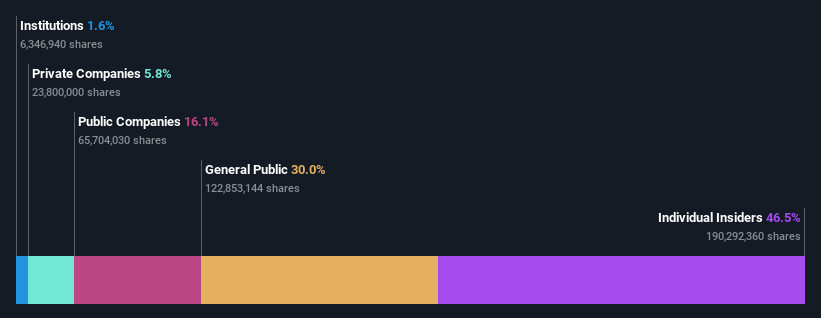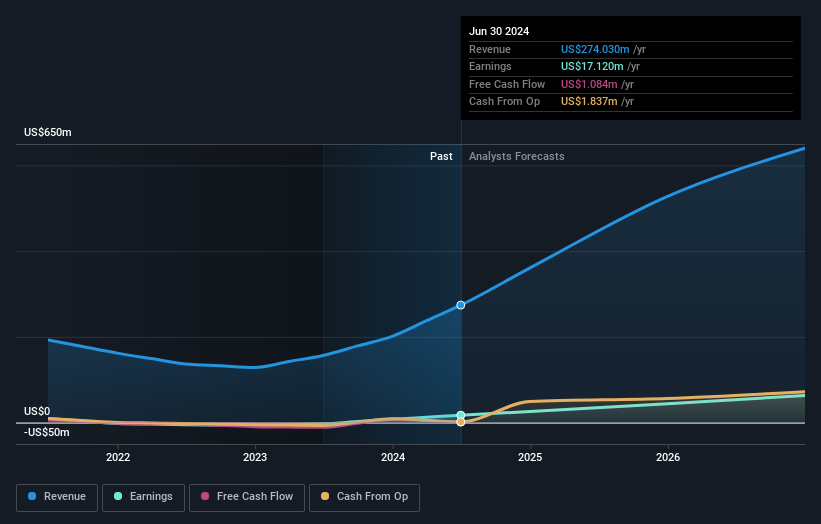- Hong Kong
- /
- Specialty Stores
- /
- SEHK:2209
A HK$262m drop in the market cap of YesAsia Holdings Limited (HKG:2209) is not what insiders like to see after purchasing shares recently

Key Insights
- Significant insider control over YesAsia Holdings implies vested interests in company growth
- A total of 4 investors have a majority stake in the company with 55% ownership
- Insiders have bought recently
If you want to know who really controls YesAsia Holdings Limited (HKG:2209), then you'll have to look at the makeup of its share registry. We can see that individual insiders own the lion's share in the company with 47% ownership. Put another way, the group faces the maximum upside potential (or downside risk).
It's interesting to note that insiders have been buying shares recently. So the news of stock price falling by 12% is not something they might have been expecting soon after purchasing shares.
Let's take a closer look to see what the different types of shareholders can tell us about YesAsia Holdings.
Check out our latest analysis for YesAsia Holdings

What Does The Institutional Ownership Tell Us About YesAsia Holdings?
Many institutions measure their performance against an index that approximates the local market. So they usually pay more attention to companies that are included in major indices.
Less than 5% of YesAsia Holdings is held by institutional investors. This suggests that some funds have the company in their sights, but many have not yet bought shares in it. If the business gets stronger from here, we could see a situation where more institutions are keen to buy. We sometimes see a rising share price when a few big institutions want to buy a certain stock at the same time. The history of earnings and revenue, which you can see below, could be helpful in considering if more institutional investors will want the stock. Of course, there are plenty of other factors to consider, too.

We note that hedge funds don't have a meaningful investment in YesAsia Holdings. Chu Lau Kwok is currently the company's largest shareholder with 30% of shares outstanding. For context, the second largest shareholder holds about 9.7% of the shares outstanding, followed by an ownership of 7.6% by the third-largest shareholder. Pak Shing Lui, who is the third-largest shareholder, also happens to hold the title of Member of the Board of Directors.
On looking further, we found that 55% of the shares are owned by the top 4 shareholders. In other words, these shareholders have a meaningful say in the decisions of the company.
While it makes sense to study institutional ownership data for a company, it also makes sense to study analyst sentiments to know which way the wind is blowing. While there is some analyst coverage, the company is probably not widely covered. So it could gain more attention, down the track.
Insider Ownership Of YesAsia Holdings
The definition of company insiders can be subjective and does vary between jurisdictions. Our data reflects individual insiders, capturing board members at the very least. Company management run the business, but the CEO will answer to the board, even if he or she is a member of it.
Most consider insider ownership a positive because it can indicate the board is well aligned with other shareholders. However, on some occasions too much power is concentrated within this group.
Our most recent data indicates that insiders own a reasonable proportion of YesAsia Holdings Limited. Insiders own HK$929m worth of shares in the HK$2.0b company. This may suggest that the founders still own a lot of shares. You can click here to see if they have been buying or selling.
General Public Ownership
The general public, who are usually individual investors, hold a 30% stake in YesAsia Holdings. This size of ownership, while considerable, may not be enough to change company policy if the decision is not in sync with other large shareholders.
Private Company Ownership
We can see that Private Companies own 5.8%, of the shares on issue. It's hard to draw any conclusions from this fact alone, so its worth looking into who owns those private companies. Sometimes insiders or other related parties have an interest in shares in a public company through a separate private company.
Public Company Ownership
It appears to us that public companies own 16% of YesAsia Holdings. It's hard to say for sure but this suggests they have entwined business interests. This might be a strategic stake, so it's worth watching this space for changes in ownership.
Next Steps:
While it is well worth considering the different groups that own a company, there are other factors that are even more important. Take risks for example - YesAsia Holdings has 3 warning signs (and 1 which shouldn't be ignored) we think you should know about.
If you are like me, you may want to think about whether this company will grow or shrink. Luckily, you can check this free report showing analyst forecasts for its future.
NB: Figures in this article are calculated using data from the last twelve months, which refer to the 12-month period ending on the last date of the month the financial statement is dated. This may not be consistent with full year annual report figures.
New: Manage All Your Stock Portfolios in One Place
We've created the ultimate portfolio companion for stock investors, and it's free.
• Connect an unlimited number of Portfolios and see your total in one currency
• Be alerted to new Warning Signs or Risks via email or mobile
• Track the Fair Value of your stocks
Have feedback on this article? Concerned about the content? Get in touch with us directly. Alternatively, email editorial-team (at) simplywallst.com.
This article by Simply Wall St is general in nature. We provide commentary based on historical data and analyst forecasts only using an unbiased methodology and our articles are not intended to be financial advice. It does not constitute a recommendation to buy or sell any stock, and does not take account of your objectives, or your financial situation. We aim to bring you long-term focused analysis driven by fundamental data. Note that our analysis may not factor in the latest price-sensitive company announcements or qualitative material. Simply Wall St has no position in any stocks mentioned.
About SEHK:2209
YesAsia Holdings
An investment holding company, engages in the procurement, sale, and trading of Asian fashion and lifestyle, beauty, cosmetics, accessories, and entertainment products.
Exceptional growth potential with flawless balance sheet.


